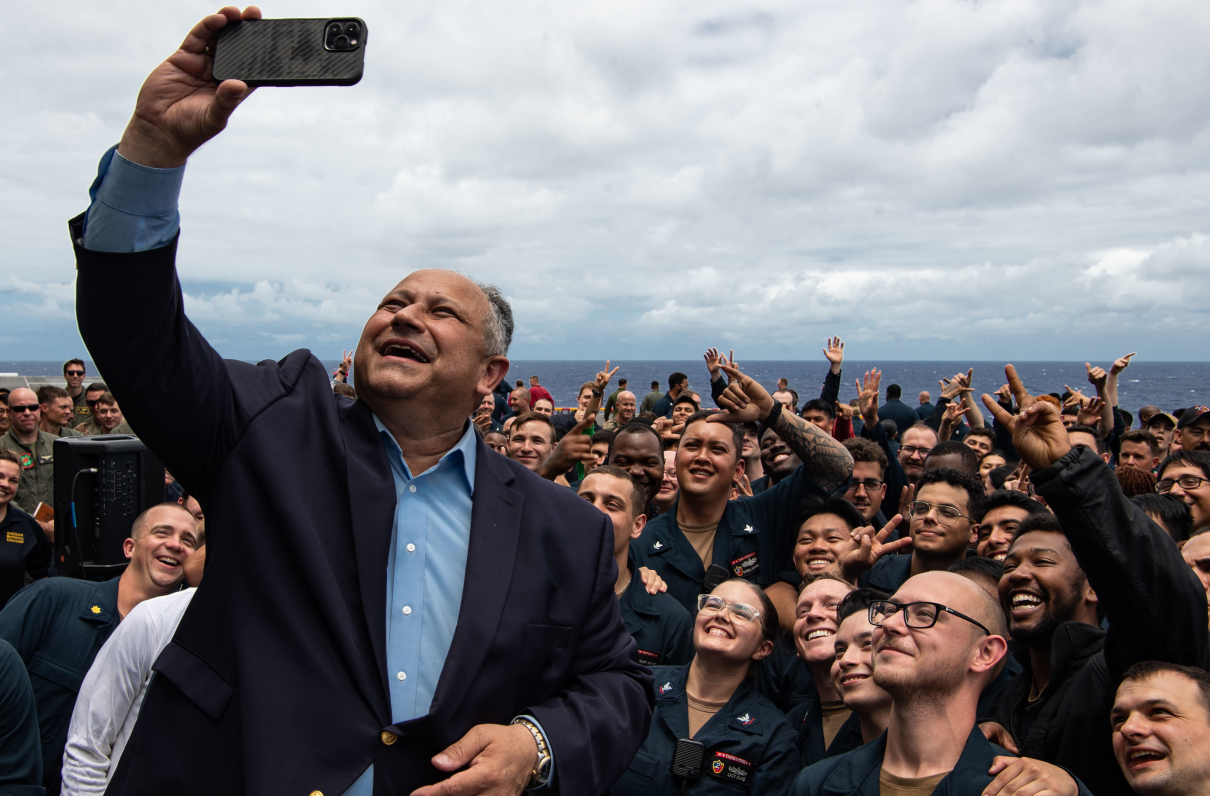(This article originally appeared in the October 2022 issue of Military Officer, a magazine available to all MOAA Premium and Life members. Learn more about the magazine here; learn more about joining MOAA here.)
Carlos Del Toro’s journey to becoming secretary of the Navy started in Hell’s Kitchen, a rough and tumble Manhattan neighborhood known for its large Irish-American immigrant population in the 1960s.
His parents emigrated from Cuba as refugees in 1962 when Del Toro was just a year old, with his father working a variety of jobs including janitor, taxi driver, and dry cleaning business owner. His mother worked as a purse factory employee and maid to help make ends meet. Despite his modest upbringing, Del Toro graduated from the U.S. Naval Academy and had a successful 22-year stint as a Navy officer. That included serving as the first commanding officer of the guided-missile destroyer USS Bulkeley (DDG-84) as well as holding important roles in both the Office of the Secretary of Defense and the Office of Management and Budget.
Military Officer asked Del Toro about how the Navy will stay ahead of emerging threats like China and Russia, and what the Navy has done to reach out to the Hispanic American community.
Q. What was it like growing up in New York City, and why did you decide to become a sailor?
A. I came to this country, to New York City, and lived on 42nd Street between 11th and 12th Avenue, just about a block away from the Hudson River. … And later on, I lived by the Hell’s Gate Bridge [on the East River]. It’s one of the most fascinating rivers in the United States. It has extremely strong currents. And because of all that, I think subconsciously, I was just kind of attracted to the water.
When I saw the James Cagney movie [Here Comes the Navy], I really became attracted by the idea of going to Annapolis. And that’s what got me started.
[MOAA INTERVIEW: Air Force Secretary Frank Kendall on Preparing for the Next 75 Years]
Q. You’ve mentioned that you want the Navy culture to be one of respect and inclusiveness. What steps has the Navy taken to do this under your watch?
A. It is important for us in the Department of the Navy, both the Navy and the Marine Corps, to establish a culture of warfighting excellence, to establish the combat readiness that we need. But in order to do so, we really need a cadre of folks that are going to truly respect each other and all that they do.
It truly is about building that trust, the trust that exists between two Marines in a foxhole, the trust that exists on board an aircraft carrier, a dangerous environment where people have to truly trust each other and understand each other’s roles and respect each other’s abilities in order to be successful.
[MOAA INTERVIEW: Behind the Scenes of ‘The Greatest Beer Run Ever’]
Q. The Army has recently had recruiting difficulties. How is the Navy trying to attract future sailors?
A. We have an economy that is strong with unemployment being extremely low. The private sector can offer very high wages. I always argue that serving in the military is more than just wages alone. Wages matter, and we have to compensate people for the hard work that they do. … But it’s also about a higher calling to service, about patriotism, about serving your country.
We want to make sure we put the right resources to educate them properly so they gain those career skills that are needed in the Navy. ... The other part of our naval culture … is that you join the Marine Corps or Navy to see the world.
[RELATED: The Army Is Having No Issue Retaining Soldiers, Amid a Crisis Finding New Ones]
Q. What efforts has the Navy made to reach out to the Hispanic and minority communities?
A. Being only the second secretary of the Navy of Hispanic descent is a statement itself, showing future sailors, Marines, and leaders of all backgrounds and ethnicities that there is a place for them in our armed forces or in public service.
I always talk about how [my] family came to the United States from Cuba as refugees in 1962, and how joining the U.S. Navy was my opportunity to show my gratitude for this country that took us in. I tell that story to give others a sense of who I am and where I came from, but I also hope to resonate with members of the Hispanic and minority communities who have similar stories as immigrants, [and] first- or second-generation born Americans.
Being a native Spanish speaker is one of my strengths, and I intend to keep using that strength to reach the Hispanic and minority communities. ... In all my travels, I always engage with the servicemembers right where they serve, from the deckplates to the tarmacs and runways, and out in the fields and ranges. That privilege and opportunity is the best part of my job.
[RELATED COMMENTARY: Here’s How DoD Can Fix Its Lack of Hispanic Leaders]
Q. Where does the Navy need to allocate its resources for the future fight? To deter aggression from China, Russia, or other threats?
A. The first priority is to maintain the readiness of our fleet. ... At the same time... we also want to modernize for the future. We want to acquire new technology, new capabilities that we can integrate into our Navy and our Marine Corps that take us to that next level. The third priority is strengthening our partnerships with our allies around the world, our industrial base, and other partners that are essential to our success.
I have also spent a lot of time traveling the world and meeting with our allies and partners, doing everything we can to form the relationships that are necessary to be able to deter, specifically, China and Russia.
Q. How would you define a good leader?
A. Integrity is extremely important, setting an example for your people is very important. But also having a strong sense of the importance of teamwork ... I think teamwork is one of those ingredients that is uniquely necessary to the success of every mission.
Military Officer Magazine
Discover more interesting stories in MOAA's award-winning magazine.

